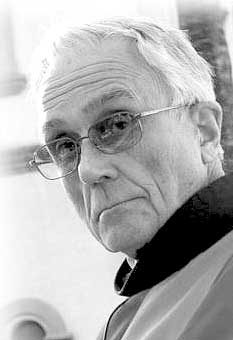 
Written between May 6, 2007 and March 9, 2009, this series of 18 articles by Fr. Larry Dunphy, OFM, looks at the subject of Social Justice from a uniquely Franciscan perspective. We are very fortunate that this gentle priest left for us a legacy of his deeply considered thoughts on Social Justice. Fr. Larry was in residence at the St. Francis Friary at the time these were written, and was heavilly involved with the Franciscan Action Network (FAN).

Article 1 - Social Justice: The Church’s Best Kept Secret
Twice a month I will be writing some reflections on Social Justice. First I will present some general background with emphasis on a Franciscan perspective, and then I will discuss specific current issues. In doing this, I hope to improve awareness and understanding so that we can make Social Justice a part of our Catholic and Franciscan thinking.
Our call to live a full Christian/Catholic life touches upon all of reality.
There is nothing that is outside the perspective of faith.
All of our human relationships, both individual and communal, are meant to be enlightened by
and examined by the truths of faith. Oftentimes Catholics want to confine faith to things that take place
in Church or that treat of sexual morality.
Our Baptismal commitment to do good and avoid evil has a much broader perspective than the scope of the Ten Commandments. It includes every aspect of our individual and social lives; that is why Social Justice is an essential part of a full Catholic life. The Church has said that its Social Justice teachings are “constitutive” of Church; that is, without such teachings we would not be Church.
It has often been said that the Church’s best kept secret is its teachings on Social Justice. This topic got little if any attention in the religious education programs that most Catholics experienced. It is infrequently referred to in homilies. When it is included, there are often negative reactions and the accusation that the homilist is getting “into politics” which “doesn’t belong in Church.”
However, Social Justice is as much a part of Catholic belief and doctrine as are our teachings on sexual morality, the sacraments, or the Trinity. Part of the problem is that it is often looked upon as a kind of special interest topic. It is viewed as something separate from the rest of our Catholic life. Yet, when understood correctly, it is an essential part of our relationship with God and our neighbor.
What is lacking is a correct formation in Social Justice. .
A reading of the social encyclicals is not the place to start.
Rather, it must start with reflection on our beliefs in God, Creation, Jesus Christ, and
on what it means to be a human being and a co-creature with all others.
Our liturgy also must help to form a spirituality of communion, out of which comes
our understanding of and motivation for social justice work.
When we understand these relationships rightly, then, we will recognize
where these God-given relationships are broken and, therefore, not just.
Wanting God’s plan to be preserved or realized, we will see that something needs to be done
to restore wholeness or correct injustices.
Next time, I will give some reflections about how our basic beliefs call us to a practice of Social Justice.
 Article 2 - Social Justice: A Franciscan Perspective Article 2 - Social Justice: A Franciscan Perspective
When we look at all of our fellow human beings and other co-creatures in light of the Gospel,
we will understand why the Church raises certain concerns in its teachings on Social Justice.
Too often we fail to recognize what is unjust according to God’s way of thinking,
because in our experience things have always been that way. Therefore, we tend to accept them as they are, thinking that
things are supposed to be that way.
We have tended to separate our theological beliefs from our understanding of and our analysis of society.
So, we need some training and guidance in applying our theological beliefs to society (our social organization, economy, politics, laws, etc.) which we tend to evaluate according to merely secular values.
True social justice is neither liberal nor conservative, neither Democratic nor Republican. It may call for viewing things in a different way than we are used to; it may challenge our familiar attitudes. For that reason, a just vision of society may make us uncomfortable, but Jesus’ teachings were never about being comfortable. Following Christ calls us to ongoing conversion. At times, therefore, we need to be made uncomfortable in our thinking in order to move closer to Christ’s Gospel message.
For those of us who are Franciscan or associated with a Franciscan vision because we attend a Franciscan parish, a socially just vision of reality begins with our Franciscan understanding of Christ. In Franciscan theology, in God’s plan of creation, God planned from the beginning that God would become human, so that a human, God’s creature, could give perfect love to God.
God as human was not a result of sin, but of God’s eternal self-giving plan of creation. God in human flesh was the model after which all else would be created. This is St. Paul’s “first born of all Creation.” After Adam’s sin, the God-Human would have to live in a world infected by sin, and, therefore, endure suffering and death. Nevertheless, Jesus remains as the first of all creatures, the model from whom all other creatures receive their worth
Every human person and every creature, from the lowly blade of grass to the magnificent planets of the heavens, shares in the divine life and worth. That divine worth makes all creatures sacred and stands as the basis for their rights. This worth is conferred by God in creating them and is not based on the behavior of the person or creature. Nor is its value measured by its contribution to either the economy or to the scheme of the universe. The justice due to him, her, or it comes from this sacred existence given by God. The rights of any creature are conferred by God in creating it and not from any human law or other human decision.
All creatures, both human and non-human, are in relationship to this “first-born of all creation” and in him to one another. This is a spiritual relationship. A truly Christian spirituality must include an understanding of this relationship. All of creation is part of our spirituality. This is a given and does not depend on what school of theology one may follow in one’s piety and prayer life.
These are some of the fundamentals out of which I plan to share further reflections on Social Justice.
 Article 3 - Social Justice: A Franciscan Perspective II - Reject of Society or Brother? Article 3 - Social Justice: A Franciscan Perspective II - Reject of Society or Brother?
Our Franciscan traditions make some special contributions to the foundations of Social Justice. Neither St. Francis nor our
principal philosophers and theologians, Bl. John Duns Scotus and St. Bonaventure, spoke or wrote explicitly on the topic.
It was not a topic of their day. However, Francis’ life and writings lay a foundation for an understanding of reality that
has profound applications in Social Justice. The philosophy and theology of Scotus and Bonaventure were shaped by their
following of Francis, and, in turn, contributed to the roots of a Franciscan view of Social Justice.
Shortly after his conversion, St. Francis moved out of his former way of life and took up residence with the lepers. In his
"Testament" he writes: “I left the world.” He left behind a world of privilege and hierarchy to live in a Christ-like way as
a servant of the rejects of society. For him lepers were brothers and sisters. A full understanding of Francis’ intent in
using the words, “Brother” or “Sister” underlies their application to a Social Justice analysis of reality.
Francis called his followers “Friars” or brothers. He lived with them, not as superior, but as brother. He meant that they
should be brothers not just among themselves, like some kind of exclusive club, but rather brotherhood was to be their
relationship to all men and women.
“Brother” was not meant to be a title, but rather, a description of a relationship that was a reality. Friars are to be truly brothers, and a sign and a model of all human and creaturely relationships, because the one Father/Mother God is the origin of all these relationships. We all are equal siblings under God; none of us has any greater privilege or worth. All are to share equally in the family inheritance.
Francis did not seek to possess creation, but rather, he saw it as belonging to God and as a book from which one could read
about God. He treated it with great reverence. He picked up a lowly worm from the road lest it get stepped upon. His great
understanding of creation and its relation to us is expressed in the “Canticle of Creation,” which he wrote shortly before his
death. The Canticle, I believe, also provides us with the foundation for a Franciscan approach to Social Justice
In the Canticle, he speaks of “Brother Sun,” “Sister Moon,” “Brother Wind,” and “Sister Water.” For us as Franciscans, this
is not poetical language, but a description of real relationships that exist between us humans and all of creation. So we
humans and all creatures are equal children of God. Creatures share in the same worth and dignity and deserve the same
respect.
I think that a basic Franciscan contribution to an understanding of Social Justice is this insight that all people and all
creatures are brothers or sisters. We all share in the same fundamental being that God has created, are made of the same
stuff. A true understanding of these relationships shows us why we must be in just relationships with all other creatures.
If we can grasp this, we are well on our way to seeing the reasons behind our Social Justice teachings.
 Article 4 - We Are All Special Article 4 - We Are All Special
Franciscans view all as equal brothers and sisters, but if we stopped there, we might fall into the error of seeing all as the same because all are equal, overlooking the importance and sacredness of the individual. Franciscan thinking emphasizes this uniqueness and sacredness and prevents us from falling into either the attitude that “I am just another one of us” or that “ she, he or it is just another one of them.”
In the Franciscan view, each person and each creature, animate or inanimate, has a unique and unrepeatable existence. Each
existence is a unique reflection of the Creator, who can never be fully reflected in creatures, no matter how many and diverse they may be. Each has what Duns Scotus calls “haecceitas” or “thisness.” Each creature is a “this” and there is no other
“this.” Each of us is not merely “not the other,” but “this,” the only one. Every creature, animate or inanimate – even a leaf or a blade of grass, every whoever or whatever is a “this.” As a unique existence each of us has our own unique right to existence. No other person, cat, dog or rock has the same existence as “this;” there has never been another one of “this,” or is there now, or will there ever be.
This perspective may seem very abstract, like some cloudy head trip or word play; however, if we really embrace this point of view, we will approach everyone/thing in a different way – as due respect and deference because of its special existence. One day while I was studying this concept and reflecting upon it, I saw a little spider run across the altar in front of me. My thumb went into an automatic “crush it” response, pausing for a moment just above it. At that moment, I recognized its beauty and uniqueness and let it continue on its way. We may too readily forget each creature’s unique existence and the respect for which that calls.
As a society, we should take the unique existence of each person into account as we determine the goals and directions of social and public policy. Individuals cannot lightly be eliminated or dismissed as merely a member of a group; nor can individuals rightfully be disregarded in promoting some social goal or good. Social good does not have some higher right over individual good. Social Justice must never lose sight of the individual’s needs, rights, or existence. “Thisness” holds an important place in our criteria for Social Justice.
Considering the “thisness” of all creatures will also affect how we approach the whole issue of the “integrity of creation.” All creatures have their “thisness” and, therefore, a right to existence that needs to be respected and preserved.
 Article 5 - Justice and Love Article 5 - Justice and Love
Seeking the true good of others in society and in the whole world – which is the goal of social justice – is, in part, an application of the command to love others. If we truly love we cannot be indifferent to the sufferings and injustices of others. To the extent that anyone suffers from injustice, the lives of all others are diminished. Pope Benedict XVI in his Encyclical Letter, “God is Love,” pointed out that we are called to love others, even those we do not like or even know. Social Justice is a part of the virtue of Love or Charity.
A truly just society must take into account each one’s relationship to God, as its creator and destiny. Human fulfillment
can only come about in relation to the infinite, which alone can satisfy human longing. We have an eternal destiny in the
divine from whom we come and to whom we will return. A truly just society promotes the well-being of the whole human being,
which must include the spiritual side.
A person’s worth and just due is not achieved merely by providing for all of one’s material needs. A promise of an earthly
Utopia does not lead to the kind of just society of which the Church speaks. Neither a capitalistic nor a socialist system
or any merely economic approach can bring about true justice. Government alone cannot bring about a just society.
Government must work for the common good; however, it is not solely responsible for it. Citizens, as individuals and
as members of various communities, share that responsibility.
People of faith need to take their faith and their formation in social thinking and analyze the society and its institutions,
including government, in light of those values. The Church as such is not there to tell a society or a government how it must
run. It must, of course, speak to what is morally good or evil. It is through its members’ participation in public decisions,
enlightened by their faith and by the teachings of the church, that it works for justice.
People of faith cannot in good conscience remain silent or passive about the decisions of government or other societal
institutions (like banks, corporations, health care systems, police, etc.) which affect the lives of all.
Economic systems are indeed of concern in achieving a just society. An economic system is not simply about money. Its
fundamental purpose is to promote the well being of its members, so that they can achieve a fully human, free and dignified
life. That fulfillment cannot be measured merely in material things or economic values. Without the spiritual, we are not
fully human. When viewed merely materially or economically, humans tend to become selfish and greedy.
Social Justice is never confined to one part of a nation or one nation at the expense of another. All are worthy, and each
cannot morally be used to the advantage of another. Justice must take a global view. Later we will talk about how this same
holistic view must include creatures, both animate and inanimate.
 Article 6 - The Difference is Love Article 6 - The Difference is Love
Although we Catholics and secular organizations pursue Social Justice and are often working on the same concerns, our approach will be different, or at least seek to include other dimensions. As I said in my last article in this series, Social Justice
is an aspect of the virtue of Love or Charity. It is concerned that the whole person be fully alive, fully human. Persons have spiritual (not necessarily religious) as well as material needs. Social Justice is not achieved when these are ignored or
excluded.
The human spirit needs love, beauty, hope, and dreams. Provision of one's material needs for food, shelter, health care,
clothing, etc. needs to happen through human relationships where recipients experience love. Loving relationships may be
excluded if food or other necessities given by loving family members to a recipient must be given a dollar value and
considered income in calculating eligibility for program benefits.
Social programs that meet material needs at the price of human and loving relationships do not help a person toward being
fully alive– which should be the ultimate goal of services. Work requirements that do not allow time for family relationships
to be developed fail to consider the needs of the human spirit.
Housing for low-income people needs to be beautiful, and residents must be allowed to participate in beautifying their
surroundings. Arts and music should not be eliminated from schools for budgetary reasons; nor should education be viewed
merely as the means for people to make a living on a material level.
Need for loving human relationships, experience of and participating in creation of beauty, and hopes and dreams are all part
of the spiritual nature of humans that must be nurtured if a society is to be truly just. Program goals need to consider the
whole person and make sure that these more spiritual dimensions are included in the total plan.
Obviously, it takes many different segments of society truly to bring about those conditions in which members of a society can
become fully alive persons. Government obviously cannot provide the needs of the human spirit, nor can organizations and
institutions as such. Of-course, the men and women who do the work of these institutions need to bring the human/spiritual
elements into the work that they do and the people they serve.
People of faith need to be aware of public programs and to advocate for public policy to include the fully human dimension.
Churches and voluntary associations of people motivated by faith or by a humanitarian love and concern for people have an
important place in achieving these goals.
Such groups, free from some of the political pressures that impede government institutions, often can address human needs or
segments of society that government cannot and can do so in some more creative ways. They can probably more quickly move to
address newly emerging needs than can the government. However, at the same time, they may impose limits upon whom they chose
to serve based on religion or ethnicity, etc. The good of humanity is probably best served when there is some mixture of
government, churches and voluntary organizations working to make a better world for all.
 Article 7 - Shared Care Article 7 - Shared Care
Government’s most fundamental obligation is to promote the common good (the good of all people and of the whole person; to arrange social conditions so that all persons and groups are able to reach their human potential more fully and easily; to be at the service of the human being at every level of society. Government must respond to human needs for goods and services, and not leave it to voluntary societies alone. The responsibility for the common good lies first with the government, but it is not solely responsible.
Government must serve all people, both the economically well-off and the
economically disadvantaged. It must help all to arrive at human fulfillment.
However, its special concern must be for those not able to achieve a fully human
life and dignity on their own. Government is accountable to its citizens for
achieving these goals. However, the existence of government and its services
does not take away the responsibility of individual citizens, businesses, and
private organizations to do their part to see that the common good is achieved
and a just society established. All are bound in justice and charity to see that the
common good is realized.
The government acts primarily through involuntary redistribution of goods from one segment of society to another. However, it can never meet all the needs, leaving room for charitable outreach of corporations, philanthropic organizations, churches, and individuals. Ideally, in a perfect social order, there would be no need to redistribute goods; everyone would be able to provide all of his/her needs without assistance. But such a society will never exist.
One of the functions of government, more primary than the redistribution of goods, is to maintain a social order by which every one is enabled, in so far as possible, to provide for self and family. Government may need to intervene, so that the more powerful segments of economy/society are not able to use their power to take advantage of the weaker segments. This has implications for just wages and safe working conditions.
In assigning responsibility for achieving the common good, the Church uses what it calls "The Principle of Subsidiarity". This means that what can be done at a lower level of society should be done there. Things that can be done at the local level if the resources, knowledge, skills, etc. are there should be done there. The Federal government should not do what the state can do. Government should not have to do what private society can do. However, where local resources are very unequal (e.g., in education, health care, support for poor), or where there is lack of will or even opposition (e.g., around civil rights), then the higher level may have to step in.
 Article 8 - Looking and Listening with Catholic Eyes and Ears Article 8 - Looking and Listening with Catholic Eyes and Ears
Throughout these articles, I am trying to point out that, for people of faith, our concerns for justice and our application of love to the concrete situations of every day life requires that we expand our awareness and concerns beyond family and friends to include concern even for persons unknown to us. We will be concerned for the poor and the voiceless everywhere. We will want to be part of a just society and realize our responsibility to see that a just society comes about.
To be involved in creating a just society requires some awareness of how our society is functioning – i.e., is it bringing people towards living a fully human life or preventing that goal? Government at all levels – national, state, and local, is constantly passing legislation and regulations that affect the more vulnerable and voiceless members of society. Often such legislation seems not to affect us directly as, for example, income support for the poor and low-income persons; mental health; where and when homeless persons may place their belongings and sleep; health care for the uninsured; immigration and undocumented persons, to name a few.
These issues, however, all deal with human persons and their right to be able to live at a fully human and dignified level. If we are concerned for a just society, we need to try to keep aware and to look at these issues from our Catholic religious values. We need not to allow them to be dismissed as “merely political” issues, nor to consider them as such ourselves.
Some businesses and industries may have unjust/unsafe treatment of employees, or show lack of respect for the environment, or perpetrate other injustices in the production or selling of their merchandise. Shopping at such businesses helps to support or contribute to these injustices. Concern for justice may cost us higher prices for more justly produced or marketed products. Our Social Justice conscience needs to be weighed in deciding to shop in those places.
We need to filter through our Catholic Social Justice values what we hear through the Media, so that we are better able to participate in social justice decision making. These matters are thrown at us from many sources; most of them are not presented from a faith and social justice perspective. We need consciously not to have our thinking determined by a merely secular perspective, but rather, to hear the issues with the ears of faith, so that we can discuss them from this perspective and share a Catholic point of view with others.
 Article 9 - Listen to the cry of the Poor! Article 9 - Listen to the cry of the Poor!
Pope Benedict XVI’s encyclical, “God is Love,” calls us to extend our attention and concerns beyond our own interests, either personal, social, or national.
We are called, as the hymn prays, to “listen to the cries of the poor.” The poor are all of those anywhere who cannot adequately speak out for their own needs, who are oppressed in any way, who suffer from injustice, or who are prevented by various social, political, economic, or military systems from realizing their full human dignity and worth. Obviously, this is something that will never fully be achieved, but is not something on which we can give up.
How to hear the “cry of the poor” may be challenging. We are not going to be able to hear it through our normal media. We are most likely to hear it when we meet someone who is poor, or when we meet someone who has met the poor and speaks on their behalf.
There are some resources for helping us hear their voice. There are Catholic and other Christian organizations who are dedicated to this kind of listening and, then, out of Catholic/Christian value systems seek to inform and educate legislators and the public and try to work for socially just legislation.
NETWORK is a Catholic lobbying organization founded by religious women and based in Washington DC that lobbies Congress and the President. Their web site networklobby.org offers online letter-writing on current issues to members of Congress and the president. JERICHO jerichoCA.org is a Christian ecumenical lobbying organization that analyzes from a faith based perspective particular laws going through the current session of the state legislature and then makes recommendations on these laws. The California Catholic Conference cacatholic.org follows pending legislation on the state level according to the seven priority issues chosen for the year by the California Conference of Catholic Bishops.
Sources like these, particularly NETWORK, offer guidelines on how best to approach your legislators. In working for justice, we do need to have passion about it; we need to want strongly what we seek, believe in and stand for. However, we need to keep our language respectful and rational. The human worth and dignity of those holding opposing views must always be preserved. Violent language never achieves peace or justice.
Language and words used are important both as we try to present our concerns and as we hear what others are saying. Labels, color words, emotive language may make objective discussion impossible. In the recent discussion about immigration, the use of the word “Amnesty” by the media and politicians skewed the discussion. It colored the perception of what was being proposed; it created a negative attitude before one could impassionedly weigh the options that were being considered. Calling people “illegals,” instead of “undocumented” or “people without papers” puts emotional connotations on the discussion and makes one forget that you are talking about human beings. Our role as people of faith may be to try to influence family and friends as to how we use language and to always try to keep the human perspective.
 Article 10 - Listen to Creation Article 10 - Listen to Creation
Creation itself today is crying out to be heard. Our non-human brothers and sisters are crying out in travail over the abuse and suffering that we humans are imposing on them. The very survival of our mother earth as a habitable place for any living creature is being threatened by our human behavior.
The effects of global warming and pollution are well reported. I do not need to elaborate here how our use of fossil fuels is contributing to the melting of the ice caps, the rising of ocean waters, creeping desertification, destruction of various species of plants and animals, etc. Our great reliance on chemicals for so many things, and our careless disposal of them, has similar disastrous consequences.
Plants, animals, water, atmosphere, etc. are voiceless and, consequently, even more vulnerable than people are to unjust or thoughtless human behavior. We need to listen to their cries and become their advocates.
Creatures, animate and inanimate, including water, air, minerals and our natural resources have rights in themselves and have a
worth and value on their own. They do not exist merely for the use of human kind. Simply because we have the know-how, the
technology and the economic power to do so, does not give us the right to unlimited use of the earth’s resources. Creation and
the resources of the universe fundamentally belong to God and are intended to reflect God’s beauty and glory and to provide for
the well-being of all humans and all other creatures both now and in the future.
We humans, as the only members of creation who have full consciousness, the power of reflection and decision making, have
responsibility to and for the rest of creation. As such, we have foresight, can see where our behavior is leading us and can make appropriate changes. We need not necessarily become victims of our long-rooted misconduct.
In article 5, I said that we cannot justify satisfying the desires of one nation at the expense of another. There is a
similar kind of moral relationship between us humans and other creatures. From a moral perspective, we are not the dominant
species. There is no dominant species. We cannot simply destroy another species or part of creation for our own sakes. I am not
saying that we cannot legitimately use creatures for our needs, but we must give consideration to their rights and never see
ourselves as the superior part of creation.
Creation is so interrelated that the loss of or the harm to any one part is a loss to all. It is like our bodies: if any one part is impaired or sick, it affects the well-being of the whole. Protecting the integrity of creation is part of justice and working
for peace within the universe.
We have arrived at a very dangerous place where we humans threaten to do irreparable harm to or even destroy our world
unwittingly. A great deal of new awareness and changed behavior is needed to prevent further harm. Our call as peacemakers is to
raise our awareness and make the appropriate changes in our behavior.
 Article 11 - Development of the Church’s Social Doctrine Article 11 - Development of the Church’s Social Doctrine
In my previous reflections, I have set out some general principles of Catholic theology concerning peace, justice and integrity of creation with a particular emphasis on a Franciscan perspective. Now I want to move into more specific topics, like labor, health care, concern for the poor, the environment, war, peace, etc. as they are presented in church documents.
It would not be accurate to say that the Church’s social doctrine began at a specific historical moment. However, we can say that the encyclical letter of one pope, devoted exclusively to a topic that has become part of what is now called the Social Doctrine of the Church, began a new direction for that teaching. In 1892 Pope Leo XIII wrote the Encyclical Letter Rerum Novarum (Of New
Things) devoted to the Church’s teaching on Labor and the newly emerging social conditions of the Industrial Revolution. This
social doctrine is not something entirely new, but is rooted in the Bible and the Church’s theology on the nature of the human
person and moral doctrines, especially those concerning property and social relationships.
There is a biblical basis for much of that teaching already in the Pentateuch in the Book of Deuteronomy. Although the words:
“Social Justice” do not occur in that biblical legislation, many of the rules set out there are precisely that. There is
legislation about the treatment of slaves, about not taking in pledge on a loan something that may be essential for the life of
the borrower, like a cloak. It pointed to the social nature of property by requiring that the harvesters leave some of the crop
behind for the poor to gather. The day’s wage was to be enough for the laborer and his family to live for a day (the origin of
the name for the coin: denarius).
In the Hebrew Scriptures, therefore, there was already a rather demanding social doctrine. As the prophets make clear, however,
it was not well-observed. The Gospels and other New Testament writings did not contain such specific social principals. However,
the New Testament teaching on the sacredness of the individual, his/her relationship to Jesus, and the unity of all peoples in
Christ under the one God provide much of the fundamental theology behind the later elaboration of social teachings. The teaching
contained in the Beatitudes, the Corporal and Spiritual Works of Mercy, the Last Judgment Scene (Mt. 25) and Paul’s teaching on
the Mystical Body are all part of the roots of the Church’s social doctrine. The social implications of these teachings have
often been neglected because of the individualistic approach generally taken to biblical teaching, spirituality, and moral
doctrine.
I am not knowledgeable nor qualified enough to address the social doctrine of the Church in the Patristic era, the Monastic Age, the Middle Ages, or the Scholastic Period. Prior to the Industrial Revolution, the social and economic conditions were more local. The general teaching of the Church at those times focused on relationships in society; the conditions necessary to bring about the new direction in the Church’s social doctrine that emerges in Rerum Novarum did not yet exist. The Church’s guidance on these matters relied more on the local Church teachers.
In the latter part of the 19th century, with the Industrial Revolution, there were significant changes in the way society was
structured and goods were produced, in the conditions of Labor, the distribution of property, and the spread of philosophical
ideas, which led to the writing of Rerum Novarum. The radically new conditions in society brought on by the Industrial Revolution motivated the Church to speak out particularly on the plight of workers. This first social encyclical is devoted not only to
labor, but also to private property, the obligations of wealth, the right to form professional associations, and it serves as a
springboard to for us to explore specific areas of the Church’s social doctrine.
 Article 12 - A Voice for Labor Article 12 - A Voice for Labor
Let’s start our survey of the Church’s social doctrine by reflecting on labor and, then, move on to other topics that have formed the corpus of the Church’s social doctrine as spelled out primarily in encyclical letters of the Popes throughout the 20th century and into the 21st.
The Industrial Revolution brought great changes in social conditions, placing great economic power in the hands of a few and
seriously deteriorated the social conditions of the rest. Under the earlier feudal and guild economic systems there was more
of a personal relationship between those in charge and the workers. With the Industrial
Revolution, many people worked for owners and producers whom they did not know, and who, in turn, did not know them. Workers became “things,” viewed merely as part of the cost of production. As a result, workers lost their dignity as persons and their status as individuals. Society was divided into classes that were intrinsically opposed to each other.
Out of that class division, Socialism emerged, appearing to offer simple solutions. It also was dehumanizing, viewing workers as a means to a social revolution, but without regard for the worker as a human person. Both systems, Capitalism and Socialism, deprived workers of freedom, dignity and the right to private property. The Church felt compelled to speak to this situation out of her pastoral concern for all parties, but with special concern for the human dignity and worth of the worker. She pointed to the unity of society and insisted that there was a mutual common interest at stake here. She insisted on the sacredness of the individual and the right of all, workers and owners, to private property and the right to form professional associations.
As with all her social doctrine, the Church’s labor doctrine begins with a recognition of and insistence upon the fundamental dignity and worth of the human individual, which is given by the Creator. This is sacred and inalienable. She also reminded all that each person is a social being, one who lives with all others and must share the universe and its resources with every other human being whose equal worth and dignity must be protected and promoted, including future occupants of the earth. Members of this human society must both give to and receive from this society. Everyone has a right and a duty to work. Work is the normal means by which people are able provide the necessities and reasonable desires for themselves and their families, to assist the needy, and to contribute to the development of the earth and the well being of the human family.
Gainful employment, therefore, must be made available to all who are capable of engaging in it. Economic policies must strive for full employment. From an ethical point of view, it is not allowed to thwart nor systematically deny this goal. Society (business, industry, institutions, government, and individuals with resources) has an obligation to promote education and other conditions that make possible professional formation and access to the job market. The state is not obliged to do this directly, but has an obligation to create the conditions that will ensure job opportunities, stimulate activities where lacking, and support people in moments of crisis.
In my next several reflections, I will continue to talk about the Church’s labor doctrine.
 Article 13 - Human Labor Article 13 - Human Labor
The true meaning of human life and the divine destiny of all human activity is the foundation for the Church’s doctrine onlabor. The purpose of human labor is not merely production of greater wealth, but also the development of the human person
and promotion of the common good.
Through labor, men and women cooperate with God in continuing the work of creation. Work is one way that humans achieve
fulfillment, self-realization, and their sanctification. However, we should be careful not to get lost in the demands of
work or take on work that undermines our moral integrity or is detrimental to others. Work is meant to contribute to the
good of all, as well as to the worker her/himself. Through work, we both give and receive. Work is for the sake of human
beings; human beings are not for the sake of work.
A number of elements combine to bring about the production of goods and services. Principal among these elements are labor
and capital. There is a complimentary relationship between the two. The two are meant to permeate each other and are not in
opposition to each other; one cannot produce without the other. However, the Church insists that labor has priority over
capital, because labor is the efficient cause that brings about the production. Labor is what makes it happen; labor does
the actual production. Capital is only the instrumental cause; it provides the wherewithal that enables the production.
Therefore, labor cannot be looked upon merely as one cost, among many, of production. In recent years, it has been
recognized that the output is best when the welfare of the worker is promoted and the individual worker is cared for.
While profit is a legitimate goal for investors/industry/business/employers, and while profit is the reason that they are
investing and running the industry/business, it cannot be the overriding value upon which decisions are made. When profit
becomes the principal driving force, we lose sight of the dignity of the worker, as well as the understanding that labor
is a cooperative and participatory part of production. Increased profits usually come from an increased contribution on the
part of labor; labor should, therefore, also receive the rewards of that increased contribution. As a matter of fact,
profits are usually better when labor shares in them.
In its examination of the relationship of employer and laborer based on human dignity and the worth of the person, the
Church has listed certain rights that it hopes will be recognized by the relevant legal/juridical system. These are: right
to a just wage; to rest; to a working environment that is not harmful to physical health or moral integrity; to appropriate
subsidies for the subsistence of the unemployed and their families; to pension and insurance for old age; to medical
insurance; in case of work-related accidents, to social security; to maternity leave; to assemble and form associations;
and to safeguard one’s personal integrity (right to opinions, thoughts, values) in the workplace.
I will address some of these rights more specifically in subsequent reflections.
 Article 14 - Some Rights of Workers Article 14 - Some Rights of Workers
The most fundamental right of workers is that of a just wage. A just wage is such that it enables a worker and his/her dependents to live at a basically decent human level so that they can obtain adequate food, health care, shelter, education, transportation, recreation, spiritual needs, and be able to perform works of charity. The mere agreement of a worker and employer on an amount does not constitute a just wage. The demands of justice take precedence over a contract. The same would apply to a so called: “legal wage.” In determining a “just wage,” the common good must also be considered. A less than just wage requires society to help meet the needs not covered by that wage.
“Rest from work” is also a right. In its teaching on labor, the Church gives a very high priority to the requirement of rest. Workers are to enjoy sufficient rest and free time to allow them to tend to their families, cultural, social and religious life. The Church documents connect this rest to the Lord’s Day, so as to allow for awareness of God’s liberation and time for communal worship. The documents say that public authority and employers have a duty to see that citizens are not denied rest and opportunity for divine worship because of economic productivity.
The Church also affirms the right of workers to form associations or unions to defend their vital interests. Even non-profit workers have a right to organize. They are a means of promoting solidarity among workers, but unions should not insist that
all workers must be members. Employers may not forbid their workers to organize, penalize workers who try to organize, favor workers who do not join unions, nor forbid organizers access to workers. The state has a duty to protect the right to
organize.
Unions should not be seen as a reflection of “class struggle,” but as instruments of promoting social justice in a struggle for good. Unions have a duty to work for the proper development of economic life and for educating the social conscience of workers, so that they recognize their responsibility in economic and social development. Unions should work cooperatively with other social entities to publicize and resolve labor problems; and to promote respect for workers’ rights. Unions should not, however, be forced to submit to political parties, nor be closely linked with them. Unions must also affirm their solidarity with workers who are not unionized, such as part-time workers, workers whose jobs are threatened by mergers, the unemployed, immigrants, seasonal workers, workers in other countries, or those lacking adequate training. Unions should be self-regulating and should evaluate the consequences of their actions on the common good.
The Church also recognizes the right to strike when it cannot be avoided or when necessary to obtain a proportionate
benefit, when every other method for resolution of disputes has been ineffectual. A strike must always be conducted
peacefully. It is unacceptable when accompanied by violence, or when objectives are included that are not linked to working
conditions or would threaten human life or be contrary to the common good. Just and necessary strikes should be honored by
the community. Boycotts in support of just strikes are just and may be encouraged.
 Article 15 - Workers Contribute to Profits Article 15 - Workers Contribute to Profits
Let me develop a little further the points made about labor in the official documents of the Church.
Workers have an inherent worth and value that may not lightly be dismissed in trying to maximize profits.
It is not just to treat workers merely as a cost factor in production.
Employers cannot realize profits without the contributions of labor. Therefore, in fairness, laborers should receive an
increase in remuneration as profits increase. When sales and profits decline, it would be equally unfair for the loss to be
borne solely by labor through job loss and/or decreased wages. Executive salaries should also proportionately decrease.
Labor has shared in creating the assets, and losses are usually not due to lack of production on the part of labor.
Therefore, labor has a right to continue to earn from that to which it has contributed. If layoffs are necessary, long-term
employees especially should receive help from employers in retraining and transitioning to new employment, if this is not
provided for by insurance or public programs. This should not be left totally the government.
This contribution of the worker to the profits of the business and the inherent value of the worker is severely discounted
when, for the sake of greater gain, employers lay off workers and/or close plants in order to earn more profits by
transferring jobs and manufacturing to other countries at lower wages. Not only are the dismissed workers harmed, but also
society bears a substantial cost. This is an unjust action. These exported jobs normally do not significantly benefit the
country to which they are exported. Often they create new social and family problems in the new country as well.
It is clearly unjust when workers are paid less than a living wage and are denied increases while the executives of the
corporation are paid millions of dollars. Boards of directors and officials determining such compensation structures fail to
recognize the contribution of the workers.
The employer is, in justice, obliged to provide safe working conditions and inform employees of risks. Machinery must have
adequate protection for workers. Those working with toxic materials must be provided adequate instruction in safe and proper use, be provided with protective clothing and masks, and instructed in the recognition of possible contamination and its
effects. Safety must be measured in light of the possible effects of continued and repeated exposure. The danger of
spreading of the toxic exposure through contact with clothing or skin to family members must be explained. Compensation for
health problems arising from inadequately informed or protected exposure must include not only the worker, but also family
members so infected.
The documents speak of collaboration between the employer and workers. This concept needs further development and
implementation, not just in ways of increasing production and profits. Both must mutually be concerned with protecting the
environment. Much harm to the environment is allowed to continue because of threat of loss of jobs if the matter were to be
corrected. Labor and capital need to research and work together on ways in which production and jobs could continue while
mitigating or eliminating the harm to the environment, or producing environmentally safe products.
 Article 16 - The Call for Peace Article 16 - The Call for Peace
The majority of the Church’s social doctrine has been about war and peace. This is not surprising, in that war has been almost constant in these past two centuries. Peace is probably our most longed for human desire. The offer of peace was Jesus’ most frequent greeting. It is an illusive desire, however, if we continue to seek peace through war. Most wars have sown the roots of the next war, because wars
never address the underlying causes and peace treaties have humiliated the defeated.
The only time of true peace on this earth was in the Garden of Eden when all people and all of nature were in perfect harmony. Once humans rebelled against God, they also turned against one another. Violence and bloodshed began once they had sinned with Cain killing Abel.
Peace in faith and biblical traditions is much more profound than the mere absence of war. Peace is seen as a gift of God and comes about through the fullness of well-being for all people; it is marked by fruitfulness, prosperity, absence of fear, and perfect joy. This ideal was to be realized in the Messianic era, but it has not yet been accomplished. Jesus sent his disciples out to proclaim peace, “When you enter a house first say: ‘Peace to this house.’” (Lk 10, 5) Promotion of peace is an essential part of the permanent mission of the Church.
Work for peace cannot be separated from announcing the Gospel with its good news of peace, but the cross is at the heart of Gospel because peace is born of Christ’s sacrifice. In the Christian view, one is willing to suffer oneself rather than impose suffering on others. Work for peace requires carrying the cross. One cannot be a peacemaker without suffering oneself.
True peace must be based on a full and correct understanding of the human person and requires a social order based on justice and charity. Every person must be given his/her full human due in both his/her physical and spiritual nature. Peace can only flow out of a pursuit of the common good. Peace is the fruit of love and happens only when all seek to give of themselves and are more concerned for the other than for themselves. In order for peace to flourish all must recognize that they are responsible for it. It comes only when family and all social institutions are involved.
Peace cannot come as long as there is injustice anywhere. There can be no peace where people anywhere do not have a basic sufficiency of food, clothing, health care, education, decent shelter, and other basic human necessities. People also need to be able to fulfill their spiritual desires. There will be no peace as long as some live in super-abundance and others do not even have basic necessities. The vast differences between the rich and poor must be reduced.
As long as nations and people look down on other nations and people, considering them to be of lesser worth or have fewer rights, peace cannot come about. Development of peoples is necessary on the road to peace. This desire to develop poorer nations must be in the hearts of all citizens; otherwise, governments will not do it.
International and regional organizations seeking development and working for peace are necessary in order to achieve peace in this world, where all are so closely united. Humans meeting together across national borders, one hopes, may come together and form bonds that will unite people together.
 Article 17 - Torture is a Moral Issue Article 17 - Torture is a Moral Issue
The U.S. Catholic Bishops this Spring prepared a study Guide for Catholics on torture. Like other social teaching of the Church, the guide is to help Catholics form their thinking and conscience and fulfill their obligation to participate in public dialogue on the matter, as well as contribute to forming a morally acceptable public policy.
The document begins with a reflection on the human dignity and worth inherent in every person because they are created by God, regardless of deformity, disability, diminished mental capacity, or moral behavior. Even those persons who have seriously or grossly violated the dignity of others retain a right to human dignity. Respect for human dignity is the starting point for all of Catholic social teaching.
In considering those who have attacked or may attack the U.S. , we must keep in mind Jesus’ command to love one’s enemies as oneself and the admonition found in St. Paul to “Bless those who persecute you” (Romans 12,14). We are discussing this topic in light of fait, which may call for a different response than what is enshrined in laws of nations or international laws, which do not always correspond to or express the demands of moral law.
The U.N. Convention against Torture (1984) defines torture: “as any act by which severe pain or suffering, whether physical or mental, is intentionally inflicted on another person.” The Bishops’ document does not attempt to set out what procedures should be classified as torture. Perhaps, what constitutes torture is best determined by those who experience it.
The Catholic teaching about torture is quite clear and may be stated: “The prohibition against torture cannot be contravened under any circumstances.” (Compendium of the Social Doctrine of the Church # 404). Or “The use of torture must be rejected as fundamentally incompatible with the dignity of the human person and is ultimately counterproductive in the effort to combat terrorism.” USCCB, Forming Consciences for Faithful Citizenship # 88) “The Church’s position on interrogational torture is absolute. It may never be used again” (Fr. John Perry, S.J., Catholic News Service, Feb. 06).
The debate about torture and the seeming desire by the government to make it acceptable has arisen out of the profound shock in reaction to the terrorist act of 9/11. People have not agreed about the right way to respond to and defend against terrorism. For some, terrorism has meant a call for new means and new norms. For some it would seem right to torture one or a few in order to prevent the death of many.
We still hold to the basic moral principle that one may not do evil that good may come of it. The U.N. Convention on torture says that no exceptional circumstances whatsoever– including war or the threat of war, may be used as a justification for torture.
Bishop Wenski of Orlando , Fla. writes: “In a time of terrorism and great fear, our individual and collective obligations to respect dignity and human rights, even of our worst enemies, gains added importance.” Torture is immoral not only because it denies the dignity of a fellow human being, but also because it saps the dignity from those who employ it. The greatest victory for bin Laden and his followers would be to turn us into the sort of likes that they are.
Vatican II pointed out that not everything becomes automatically permissible between hostile parties when war has, regrettably, commenced. The temptation in war is to take off the gloves and play by new rules so that we become exactly like what we hate.
Remember that Jesus himself was tortured on the way to his death. Every act of torture repeats his torture. Next time some ideas for our response.
 Article 18 - A Response to Torture Article 18 - A Response to Torture
The U.S. Bishops offer 10 suggestions for a response to torture:
1) Raise your awareness of torture: More than 150 governments practice torture. Survivors of torture may be our co-workers and commuters. The effects of torture are never healed. Learn more about torture, torture survivors and efforts to help them on the web site of the Torture Abolition and Survivor Support Coalition www.tascc.org
2) Stop using euphemisms for torture: The use of “sanitized” or “evasive” terminology or “skewed definitions” about handling of prisoners has a way of keeping torture from coming into full view and dulling our awareness of injustice. “Enhanced interrogation,” “extraordinary rendition,” and “abuse” are frequently used euphemisms for torture. “Sleep management” is a euphemism for sleep deprivation; “stress positions” is a euphemism for forcing people to assume cruelly punishing postures for long periods.
3) Educate and pray: Invite a torture survivor to speak at church. Set up a torture display in church like the one setup on a side altar in a church in Rome to look like a prison cell–dark, with bars across the stained glass window and instruments of torture placed around it: chains, pincers, handcuffs, whips, needles, blindfolds, and photos of recent victims. People prayed at the torture display in the church.
4) Consider signing a Statement of Conscience: Visit the web site of National Religious Campaign Against Torture (NRCAT) www.nrcat.org for a statement of conscience. Other options for protest: display an anti-torture banner: “Torture is wrong” or “Torture is a moral issue” at church, school, or other location; write a letter to the editor; urge legislators to support legislation banning torture.
5) Pray for Enemies: We need to pray every day for our enemies to avoid the toxin of hatred and to see them more clearly as persons. Prayer counters the temptation to demonize.
6) Overcome evil with Goodness: Pray for divine guidance for our nation and all nations. Insist that our national response to acts of terrorism is in accord with the teachings of Jesus, meets the criteria for a just war, and that we do all we can to avoid the taking of innocent human lives in military action.
7) Participate in Interreligious dialogue: Know who your enemy is not. Become a peace builder. Interreligious dialogue is necessary for peace, particularly since terrorists attach a religious justification to their actions. Interreligious dialogue fosters respect for each other’s God-given dignity, recognizes the right of each to seek the truth for oneself, and teaches who is not the enemy. Through interreligious dialogue, world religions can be positive forces for peace and goodness.
8) Prepare the young for a new world dialogue: Educate young people in the fundamental values of human dignity, peace freedom and solidarity. Invoke a desire to know other people, share their sorrows, and understand their deepest feelings.
9) Fast for Peace and Justice: Fasting is penitential, a form of prayer, a solidarity with the suffering. The U.S. Bishops suggest one day a week for fasting for justice, peace and protection of innocent human life.
10) Act to foster justice in the world: Injustice is a field in which terrorism can grow. True peace needs justice to correct the economic imbalances and political disturbances that give rise to tension and threaten every society.
PEACE AND ALL GOOD
|



